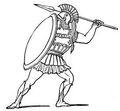THE SPARTANS & THE FAMOUS BATTLE OF THERMOPYLAE
The Battle of Thermopylae (pronounced "ther-MOP-i-lee") in 480 BC is perhaps the most famous military last stand of all times. It was an "against all odds" battle which has inspired people over the centuries because of the bravery and determination of the Spartans. Military leaders cite it as an example of training, equipment and use of terrain. It has become a symbol of courage against overwhelming odds.
The battle took place in Greece between the Greek army and the army of the Persian empire. Greeks were led by soldiers from Sparta, a Greek city state. The spartans were a select group of Spartan soldiers who had been handpicked by King Leonidas, commander of the army. They were "sire only" warriors which meant that each one had already sired a son and were a suicide unit in the sense that each man was prepared to die in battle if necessary. Sparta was known for its military society and its army. Its society was focused almost entirely on warfare. The Spartans were famous for their military culture. The role of the Spartan army was to serve Sparta by protecting its borders and the massive slave population it controlled. Its army was one of the most feared forces in the ancient world
The Persian army, led by Xerxes, had already crossed Europe on its march to Greece for a second attempt to conquer Greece. The Persians had planned this invasion. They had set up major food depots along the planned route and brought a navy for support. Before the invasion began a Persian was sent to King Leonidas to negotiate a treaty. Leonidas’s response was to "come and get them" and sent the Persian back empty handed.
The Greek force had about 7,000 men compared to the Persian army with between 100,000 and 300,000 men. The Greeks took a stand at the narrow pass at Thermopylae which led to central Greece. At its narrowest point it was only 50 feet wide with mountains and other inacessible areas blocking access unless through the pass. The Greek army was blocking the only road through which the Persian army had go to invade Greece.
The Greek’s were equipped with a long spear and a heavy shield plus body armor. The Persians had a shorter javelin like spear and a light wicker shield instead of the bronze shield of the Greeks.The Greeks used a wall of overlapping shields and spears to span the entire width of the pass. The  Persians use of arrows and their shorter spears with light armor were not enough to break through. Over two days of battle the Persians could not get through even when they tried an assault with "the immortals" an elite corps of 10,000 men who were specially trained as soldiers. The Greek king arranged relays of fresh troops to the front line. After repeated attacks the Persians abandoned the attempt leaving piles of dead Persian bodies behind. It was clear that a frontal assault was not going to work.
Persians use of arrows and their shorter spears with light armor were not enough to break through. Over two days of battle the Persians could not get through even when they tried an assault with "the immortals" an elite corps of 10,000 men who were specially trained as soldiers. The Greek king arranged relays of fresh troops to the front line. After repeated attacks the Persians abandoned the attempt leaving piles of dead Persian bodies behind. It was clear that a frontal assault was not going to work.
But, late on the second day of fighting a local man agreed to show the Persians a path around the pass and to guide them behind the Greek front line in exchange for a reward. Leonidas had stationed some 1000 Phocian volunteers to guard this path but they were surprised by the Persians who fired "showers of arrows" at them. The Phocians retreated to make a last unsuccessful stand and were killed. The Persians advanced to outflank the Greek army.
When Leonidas discovered he was being outflanked he decided to save his army by sending them away and stall the Persians to allow their escape. He stayed at the battle scene with 300 Spartans and 1100 other members of the Army to make a last stand. They were totally outnumbered by the Persians.
The Greeks met the Persian army in the wider part of the pass. The Greeks fought with spears until they were shattered or lost. They then fought with short swords and finally in hand to hand fighting until most of them were killed. The Persians surrounded the remaining army from the hills and rained down arrows until the last Greek was dead. Xerxes was so enraged by the Greek toll on his army that he had the head of the body of Leonidas cut off. The Persians then advanced on to Greece.
The rest of the story is that while the Persians successfully invaded Greece the Greeks created a blockade of the Persian ships preventing the landing of more troops. In a naval battle the Greek fleet destroyed much of the Persian fleet. Xerxes became fearful his army might be trapped in Europe so he retreated back to Asia. But, the bravery of the Spartans at the battle of Thermopylae lives on through history.
